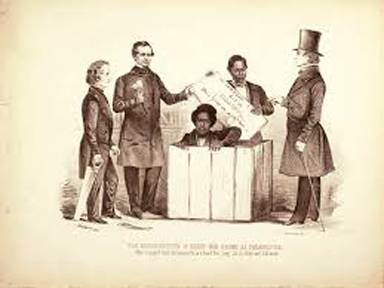THE LEGACY OF OUR ICONS
All too often, in this fast paced, on demand world, it has become incredibly easy to take for granted the genius of the individuals that equipped us with the everyday tools to make our lives easier from the light bulb, to automatic transmission, even the ice cream scoop. African American inventors have played a huge role in shaping the world we live in today. Some of these heroes and heroines, unfortunately, will not be found in textbook… so we here at the Westside Gazette have compiled a list specifically geared towards recognizing our amazing ancestors. We hope you enjoy and if there’s anyone you would like for us to recognize whether past, present, world renowned, or local, please feel free to email us at positivitypays365@gmail.com.
Henry “Box” Brown
Performer, Magician
Born: 1816 • Died: June 15, 1897
Henry “Box” Brown was an enslaved man who shipped himself to freedom in a wooden box. He developed his published slave narrative into an anti-slavery stage show.
Henry “Box” Brown was born, enslaved, on a Virginia plantation in 1815. After his family was sold, Brown committed himself to escaping from bondage. He had himself shipped in a wooden box from Virginia to Philadelphia, where slavery had been abolished. Brown was subsequently the subject of a popular slave narrative, which he adapted into a stage show. The details of his death are unknown.
Henry “Box” Brown was born enslaved in Louisa County, Virginia, in 1815. The precise date of his birth is unknown. At the age of 15, he was sent to Richmond to work in a tobacco factory. Although he married and had four children, he was unable to live with his family. In 1848, his wife and children were sold to a plantation in North Carolina. This tremendous loss fueled Brown’s fervor to escape from slavery.
Brown, an active member of a local church, enlisted fellow parishioner James Caesar Anthony Smith and a white contact, Samuel Smith, to aid him in his escape. Brown’s plan was to have himself shipped as cargo from Richmond to Philadelphia, where slavery had been abolished.
Samuel Smith shipped a box containing Brown by Adams Express Company on March 23, 1849. The box, labeled “dry goods,” was lined with cloth and had a single hole cut in the top for air. 27 hours later, the box arrived at the headquarters of the Philadelphia Anti-Slavery Society. Emerging from the box, Brown recited a psalm.
Following Brown’s successful escape, Samuel Smith attempted to ship more enslaved people from Richmond to Philadelphia on May 8, 1849. His plan was discovered, however, and he was subsequently arrested. James Caesar Anthony Smith was also arrested on similar charges, though he did not serve time.
Given the dangers of making Brown’s escape public, some abolitionist leaders—including Frederick Douglass—argued that it should be kept confidential. Others argued that the story would inspire other innovative and daring escapes. Brown made the decision to publicize his experience. Shortly after his escape, Brown appeared before the New England Anti-Slavery Society Convention in Boston. He subsequently toured the region performing his story. Boston publisher Charles Sterns also published a version of the story, which would become one of the best-known slave narratives in American history.
Brown again developed his stage show to include a panorama on the institution of slavery. In 1850, the “Mirror of Slavery” show opened in Boston. After passage of the Fugitive Slave Act later that year, Brown moved to England with his panorama. He remained in England for the next quarter-century, marrying and fathering a daughter despite criticism that he should purchase the freedom of his first wife and four children.
In 1875, Brown returned to the United States with his English wife and child. He performed as a magician to make a living. As part of his stage act, he emerged from the original box in which he had traveled to freedom.
Brown’s last recorded performance took place in Ontario, Canada, on February 26, 1889. The date and location of his death are unknown.

